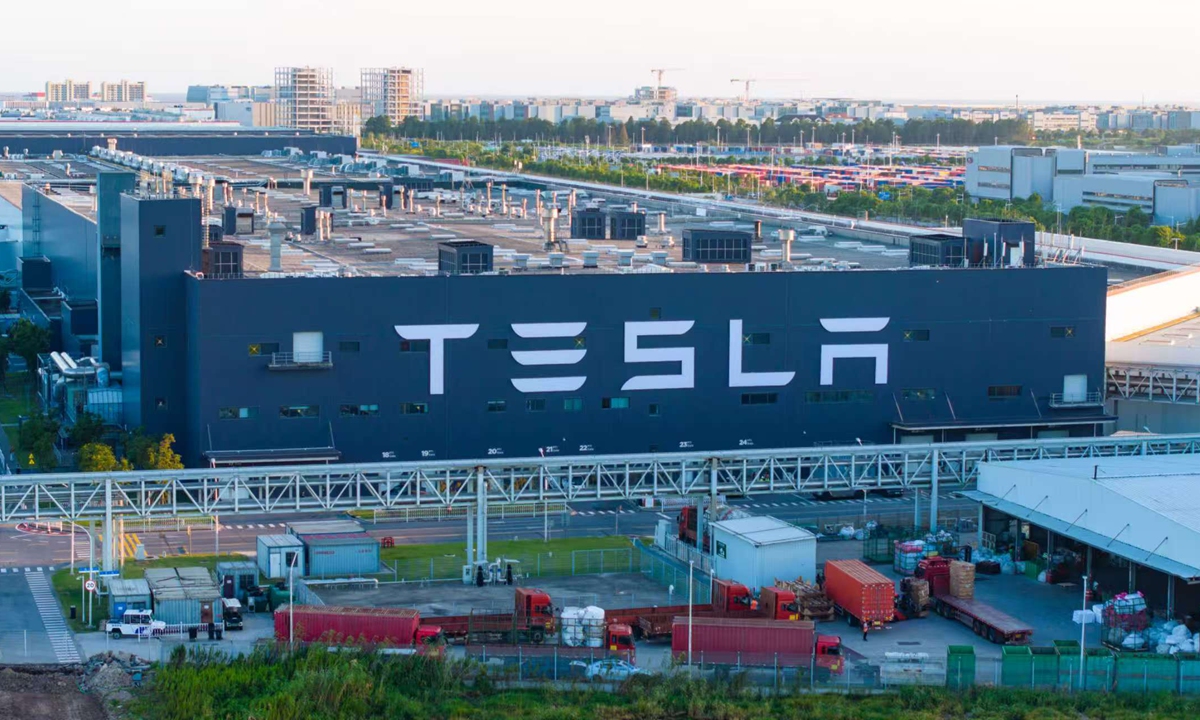
政府新闻
特斯拉上海超级工厂10月份出口汽车超过3.5万辆,创两年来最高月度水平 2025-11-17

Tesla's Gigafactory in Lingang, Shanghai
Tesla's Shanghai Gigafactory exported more than 35,000 vehicles in October, the highest monthly volume in two years, with Model Y exports surging 214 percent year-on-year, a company representative told the Global Times last Thursday.
A Chinese expert said that the strong performance was underpinned by China's fully developed new-energy vehicle (NEV) manufacturing chain, adding that despite the global rise in protectionism, China is keeping its manufacturing sector open to investors worldwide.
A Tesla China representative told the Global Times that at the start of each quarter, large batches of new vehicles from the Shanghai Gigafactory are shipped to Europe, destinations in the Asia-Pacific region and other markets.
Last Wednesday, Tesla announced on Weibo that the 5 millionth battery pack produced at its Shanghai Gigafactory had rolled off the line. As a core component of electric vehicles (EVs), battery packs made at the plant are widely used in the company's key models, including the Model 3 and Model Y, the company said.
Tesla's Shanghai Gigafactory, located in the city's Lingang New Area and covering 860,000 square meters, is China's first wholly foreign-owned vehicle manufacturing project and Tesla's first overseas complete-vehicle manufacturing base. The plant began production at the end of 2019.
In November 2024, the Gigafactory rolled out its 3 millionth vehicle and exported its 1 millionth car. The plant delivered more than 916,000 vehicles that year, accounting for half of Tesla's global deliveries, Tesla said.
According to the China Passenger Car Association, Tesla sold 61,497 China-made electric vehicles in October, including exports.
The plant's supply chain localization rate has reached about 95 percent, compared with just 30 percent at the end of 2019, according to media reports.
It is not only Tesla that has been drawn to China's mature vehicle manufacturing chain. In recent years, many leading foreign carmakers have announced plans to deepen their footprint in China, stepping up efforts to seize opportunities in the world's largest market for EVs.
Amid the global shift toward electrification and intelligent mobility, China's auto industry and its companies have seized the momentum, delivering cutting-edge technologies, a complete industrial chain and a highly competitive market environment, insiders noted.
At the recently concluded 8th China International Import Expo, Nissan held a launch ceremony for a new joint venture. The company, jointly funded by Nissan (China) and Dongfeng Motor Corp with an investment of 1 billion yuan ($140 million), will be owned 60 percent by Nissan and 40 percent by Dongfeng.
In June, ground was broken for Lexus, Toyota's premium brand, at its first wholly owned EV plant in China, located in Shanghai's Jinshan District, the Shanghai Commission of Economy and Informatization said on its website.
The plant is expected to be completed in August 2026 and begin operations in 2027, with an initial annual capacity of about 100,000 vehicles. Its products will be sold in China as well as Japan and other overseas markets.
China has designated the NEV sector as a strategic industry and built a comprehensive policy ecosystem that foreign carmakers can plug into to reduce production costs and pursue collaborative innovation, Wang Peng, an associate researcher at the Beijing Academy of Social Sciences, told the Global Times last Thursday.
China's passenger vehicle market has grown increasingly attractive to global automakers. Starting from 2026, FAW-Volkswagen will add 11 new models under the Volkswagen and Jetta brands, according to the official announcement from the company.
As the world's largest auto market, China continues to draw multinational carmakers deeper into its local supply chains, fostering a "China manufacturing + global market" model, Wang said.China's new Special Administrative Measures (Negative List) for Foreign Investment Access (2024 Edition) took effect on November 1, 2024, reducing nationwide restrictions from 31 items to 29. All foreign investment restrictions in the manufacturing sector were removed.
The move underscored China's firm commitment to advancing high-level opening-up and sharing development opportunities and benefits with the rest of the world.
Wang said that the stability of China's institutional and regulatory environment is a key reason foreign automakers are expanding their presence. By shortening the negative list and improving the business environment, China has created more predictable conditions, enabling the industry to shift from being "policy-driven" to "rules-driven" and encouraging foreign firms to locate higher-value activities such as research and development in China.
Wang noted that China's vast market and data resources also provide foreign companies with a real-world testing ground, accelerating technological iteration and forming a cycle of "innovating in China to serve global markets." Through its openness and full-chain industrial system, China has become both a stabilizer and an enabler of the global NEV sector, he said, adding that multinational automakers doubling down on China will help shape a new landscape where "China leads and the world benefits."
Source: Global Times

